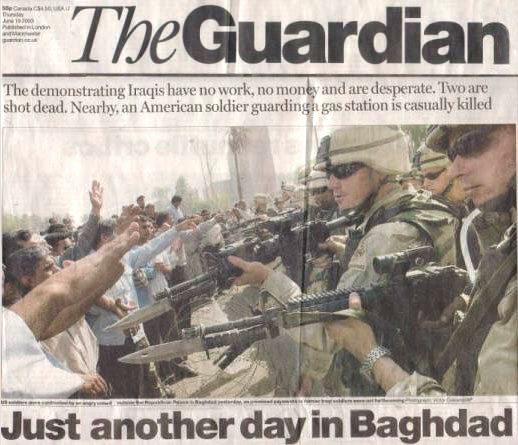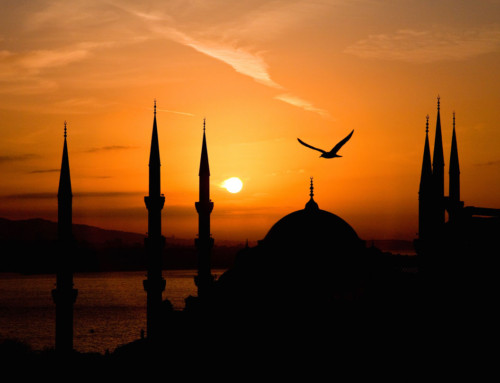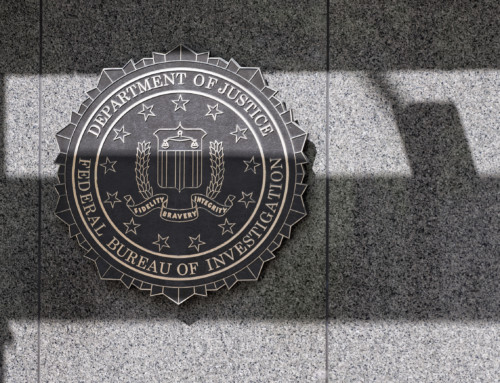“The Americans always do the right thing…after they’ve exhausted all other possibilities.”
Winston S. Churchill
Similarly to this phony outrage over Bush’s state of the union speech, one can only conclude that, in an effort to impose on the rest of us their own sense of shame about defending the nation, former Secretary of State Madeline Albright, and Andrew Kohut of Pew Research recently collaborated on a much publicized twenty-country opinion poll called the Global Attitudes Project. Fouad Ajami adroitly points out was it was filled with leading questions like “What’s the problem with the U.S.? Is it mostly Bush, America in general, or both?” And so not surprisingly, the study found that anti-American sentiment is rising precipitously and presumably above pre-Iraq-war levels, even among our traditional allies. However, the results of the study are not really news because, for example, as Ajami also points out, the plot to kill 3,000 Americans on 9/11 was hatched in the 1990s, on Ms. Albright’s watch. The study merely confirms a trend that had been in place for quite a while, finding in France, 6% of the responders said that they have a very favorable opinion of the U.S. with 22% very unfavorable, in Germany, 4% to 30%, Spain 3% to 39. But even discounting the anti-U.S. bias built into the Pew poll, what is alarming is that in Britain, where we’ve had a “special relationship” since 1940, and who may be our only reliable military ally against the terror network, 14% were very favorable with 16% very unfavorable.
While in London last month, I sought out a small cell of British kindred spirits Merry Cave, Roger Scruton, and Mary O’Keefe, who are contributors to a conservative magazine Salisbury Review. I asked them, as professional commentators on European sociopolitical developments to help me understand why anti Americanism is rising even in England specifically and in Europe generally and what is it that’s making the Europeans so upset.
The Salisbury Review (SR) unlike post-Thatcher Toryism which has drifted far to the left, is a magazine guided by core conservative principles and, as it’s Managing Editor, Mary Cave describes, is a “voice crying in the wilderness.” She writes in the lead editorial of their Twenty-Year Anniversary Issue that “…the most solid achievement of the Salisbury Review is perhaps the help it gave to encouraging democratic energies in Eastern Europe in the last dark moments before the dawning of the post-Soviet era…”
One of the founders of the magazine, Roger Scruton, is rare in Britain in that he is a conservative college professor, as well as an author and philosopher, elaborates on the historic role the magazine played in the anti-Soviet movements of the Warsaw Pact countries. “… because alone among Western politicians, Thatcher and Reagan had shown a determination not to merely confine communism but, if possible destroy it, the dissidents looked to the conservative movement in the West to provide the concepts that they needed.” Together with a small group of writers from the West such as Scruton, prominent East bloc dissidents such as Vaclav Havel published in the Salisbury Review under their own names, others less prominent, under pseudonyms. It was this East European dissidence, inspired by a European conservatives, that played a key role in convincing Gorbachev to bring his armies out and allowing its people to go free.
The week I arrived, the British print and electronic media was abuzz with stories about the lack of our finding WMD’s, frustrated Iraqi’s that were going “postal,” Blair’s supposed deception that duped the British parliament into going along with the Americans’ war, but the Daily Telegraph scooped them all with its three-part, 20-thousand word story entitled The New Empire – An American Odyssey. The Telegraph’s self-proclaimed neo Homeric hero, Graham Turner, began his piece with the sub headline, Why is there such deep distrust between America and the rest of the world?
I had lunch with Mary O’Keefe and Merrie Cave and asked them to describe the growing rift between the U.S. and England and Europe.
Merrie Cave: I think this business of missing weapons is a red herring. He (Hussein) may have taken them wherever he went. We just don’t know. But for the moment many on both the left and the right here are not so much mad at the Americans as much as they see great dangers and are worried. It’s more about what’s going on in Iraq now. The Shiites who have been suppressed for so long, could become a very great nuisance. And those of us with long memories remember when the British had to look after Iraq after the First World War and know that experience wasn’t very happy either.
Larry Kelley (LK): Many in our own U.S. press lecture us on the fact that we suffer from world enmity because we’re viewed as unilateralists, by not signing the Kyoto treaty, not joining the ICC (International Criminal Court) not getting U.N. approval for war. Does that contribute to British animosity?
Merrie Cave: No, because a lot of us are, in fact, very anti-European Union. There is a huge movement here against the coming dictatorship in Brussels. There was a poll on the new constitution and a majority of Britons want a referendum on it. This sclerotic group of countries on the Continent are going to try to impose a xenophobic culture where racism will be a capital offence and where there will be something called the European arrest warrant which would allow me, for talking as I do, to be packed off to Greece or somewhere.
Mary O’Keefe: Part of it (British animosity toward the U.S.) is that we are taught to hate ourselves. It’s the powers that be that control both our “chaterotti” and the schools that teach us to despise our history. Due to our empire and so on, it’s a form of self-loathing that we know and understand.
LK: What you’re saying is that a self-loathing is then projected outward toward us?
Mary O’Keefe: Yes, and this is all new to you Americans. You may not think you have an empire but you certainly are felt to have an imperial role in the world and you certainly have a monopoly of power, which is new just since the close of the cold war. And so the first thing is that you’re probably not familiar as we are with being loathed for your empire. Also, it’s partly envy that you’re powerful, rich, and confident. Third, your culture is easy with its consumerism, music, dress, fast food, and its inherent freedom. Even some of our own TV shows are, if you will, the American package. But the irony is that people around the world love your culture because it is so easy. But the root of it (anti-Americanism) must be for all of Europe I think to degree envy because no European country is confident now and hasn’t been for a long time.
And then you add the shock of watching an invasion that the BBC is characterizing as illegal. And on top of it, people have gone along with the idea that George Bush didn’t actually win the election and plus he’s an idiot.
Later that day, I spoke to the professor, composer, journalist, publisher, author of 32 books including 5 on aesthetics, and philosopher, Roger Scruton, at his home outside the rural England village of Wiltshire.
LK: Are the missing weapons of mass destruction (WMD’s) in Iraq a real issue or is it just the latest attack “de jour” coming from the left and anti-American crowd?
Roger Scruton: I think this is a real issue for our Labour party, those in Parliament, because they were persuaded to give their reluctant support for the war on the grounds that there really was a dangerous situation building up in Iraq and if we didn’t do it (begin the invasion) soon, there were going to be some extremely bad consequences. I myself think this is extremely naïve because it is not the issue of whether there were WMD’s but rather was this regime actively seeking to acquire them and would they be likely to use them. I think that is certainly true. And it’s that intention that’s the dangerous thing, much more so than the objects themselves.
LK: Yesterday the front pages of the London newspapers printed a warning that the head of MI5, Eliza Manningham-Buller, issued a warning that it was not a question of if but only when a western city will be attacked with a WMD device. What do you suppose the British and European sentiment will be when that occurs? What if anything would change?
Roger Scruton: It depends on which type of weapon is used. An anthrax or small pox release can be contained up to a point. But a nuclear bomb detonating on New York or Washington could change everything forever because it could bring the whole organization of your country to an end. All expectations as enshrined in law and business, insurance could cease. And that has to be born in mind along with the fact the terrorists who would do this seem to have no other motive other than destruction which means you can’t bargain with them. There’s nothing that can be achieved by meeting with an Islamic fanatic because he thinks he’s acting in behalf of God as he sees it.
So we’re in an extremely dangerous situation and we have to take what measures we can to prevent WMD’s from ever being used. And therefore my view is that practically any measures are justified given the enormity of the consequences of our not succeeding in keeping these weapons out of the hands of terrorists. And secondly America must act preemptively.
LK: Do you think that it’s implicit in anti-American sentiment that is rising here in Britain and even more so on the Continent, is a disconnect or an inability to understand the gravity of the situation as you just described it?
Roger Scruton: Yes, because we’re all somewhat reluctant to look on something so horrifying. Everyone has a motive to deceive himself about it. What we’re seeing in this anti Americanism is a kind of collective self-deception. The transferring of blame to the Americans is an effort to make it seem that something else could be have been done to save us. But when you look at the actual reality of the situation, its much more serious than that.
LK: I read the results of a Zogby poll conducted here shortly after 9/11 where 40% of British Muslims indicated that they favored the operation. Would you agree that the Europeans who have a negative view of our taking firm decisive action are ill-advised, given that there are likely a great number of home-grown terrorists living among you?
Roger Scruton: Yes, I’ve written about that in my book, The West and the Rest, and what you’re citing is a strong indicator for what is happening to Europe. Most of the Muslims who have immigrated here are from the Middle East and North Africa. And they come with no conception of political loyalty. Their only loyalties are either tribal or religious. So when they settle in Britain, France or Germany, they never seem to develop any loyalties to the surrounding political or social order. And there are numerous historical reasons for this. It means in effect, we have allowed immigration of potential enemies into our midst. And I think the French, in particular, are alarmed by this and it’s one of the reasons why Chirac acts in this cautious and seemingly anti-American way. He’s extremely afraid of the 5 million unstable people who, while being legally French citizens, have no French loyalty at all. This is a very dangerous situation.
LK: What with the new mass graves being uncovered and Hussein genocide numbers climbing higher and higher, do you see European resentment of the US softening? Has anti Americanism crested and is it subsiding?
Roger Scruton: Well, I think there is considerable alarm among educated Frenchman, about anti Americanism. You have to recognize that France is in a state of turmoil. And would have been anyway without 9/11 because of its unsustainable North African immigration (which is populated) by people who refuse to integrate and who carry out terrorist attacks in Paris. The French are alarmed by this. And in that regard they have a motive to deceive themselves by inventing easy solutions. And anti Americanism should be seen in this context. It’s the easiest solution to all these deep conflicts because it transfers the blame to the most powerful but indeed the most reasonable player in the game. And in that regard makes it look as though the problem is solvable.
LK: Now that the U.S. alone has the economic strength to project military power around the world, to what degree do you think that old-fashioned resentment of that plays a role?
Roger Scruton: There is that. Nieche said that resentment will henceforth be the central motive and emotion of people as they lose their religious sense. But I suppose there can be some criticism of capitalism and the Americans’ propagation of it as it pertains to its seeming disregard for delicate social organisms such as the food economy where small farms are being wiped away all over the world. Fast food restaurants displace traditional forms of family eating, amoral television, MTV, and pornography and the like which all form a kind of wind of over-heated gases that blows across the landscape and frighten people quite rightly. And so, in that regard, there is a legitimate side to this resentment.
While in London, we visited a close childhood friend of my wife’s, Cly Wallace, an American public relations executive, who has worked abroad most of her career, and has been in London for the past three years. I asked her to comment on the resentment engendered there by our invasion of Iraq.
Cly Wallace: Americans completely underestimate the extent to which the average European sees the U.S. as the oppressor. Saddam Hussein and Iraq, until recently, meant nothing to them. But what affects them and is in their face every day is the American presence. The average European constantly affected by our economy and culture. He knows everything about American politics, the scene in L.A. Washington D.C., etc. What do average Americans know about Europe? Nothing. It doesn’t really affect them. I’m speaking here more about perception than reality. But I think it’s very hard for Americans to understand how there’s a way in which America can become the enemy.
LK: We’re the enemy until a 9/11 event was to happen in say London or Paris?
Cly Wallace: Exactly. That changes everything.
Bill Emmot, the British Editor in Chief of the Economist Magazine and himself a British citizen and Londoner, weighs in and discounts the purveyors of anti-Americanism in his new book, 20: 21 Vision, Twentieth Century Lessons for the Twenty-first Century and entitles a whole chapter – European Envy. He writes, “For the most part, America has since 1945 built (for the first time in human history) a cooperative empire, one that is intended to be mutually advantageous to virtually all its members…for a pragmatic reason, a cooperative empire is a lot cheaper to maintain than a coercive one.”
And in a remarkable display of candor, Emmot avers, “…when push comes to shove European interests and America’s seem mostly to coincide…in the end, they (the Europeans) are happy that the real adults, the Americans, are there to sort things out, to provide a secure home, and to pay the bills.”





